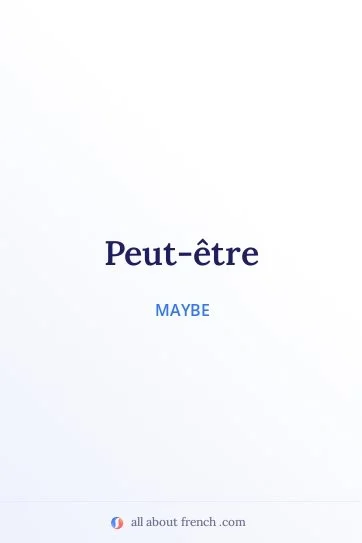
Get prepared to discover everything you have to know about the basic word "Peut-être". It includes a complete guide of what it is and how you can use it in a normal conversation with an audio example. Plus, we also added some useful stuff like slow pronunciation audio, synonym, dialogue example and more!
Translation : Maybe
Register : Neutral - Basic
Slow
Normal
IPA : / pøɛtʁ /

The literal meaning is:
It's the most famous French way to say "Maybe" or "Perhaps" or even "Possibly".
We can use it in different ways as you will see in the next section. Also, don't forget to check the "Synonyms" section below for all the variations of "Peut-être" you can use!
First, like in English, do not confuse the expression "Peut-être" with a hyphen which means "Maybe" and the group of words "Peut être" without hyphen which means "Can/May be".
For example, if you want to say "He can/may be stupid sometimes" → "Il peut être bête parfois" (WITHOUT hyphen). But if you want to say "Maybe he is stupid" → "Peut-être qu'il est bête" (WITH hyphen)
The structure "Peut-être + que" is used very often when you want to precise what your "Maybe" is about.
Another structure is to put it at the end of your sentence to add uncertainty when you are not sure about your assumption or statement: "Elle ne voulait pas venir, peut-être" → "She didn't want to come, maybe".
Finally, you can use it as a standalone answer when you are unsure and can't say "Yes" or "No". For example, someone asks you "Tu viens ce soir ?" (Are you coming tonight?) but you don't know yet, you can say: "Peut-être" (Maybe).
And some antonyms:
↓ Example in a story with slow French audio ↓
Finally, let's see an example in a parallel story with slow audio.
Chasse à la boucle d'oreille
Earring hunt
10%
The story just started!
Get full access to 365 texts and quizzes, including this one.
 Discover more
Discover more Already a member? Full story and quiz here.
